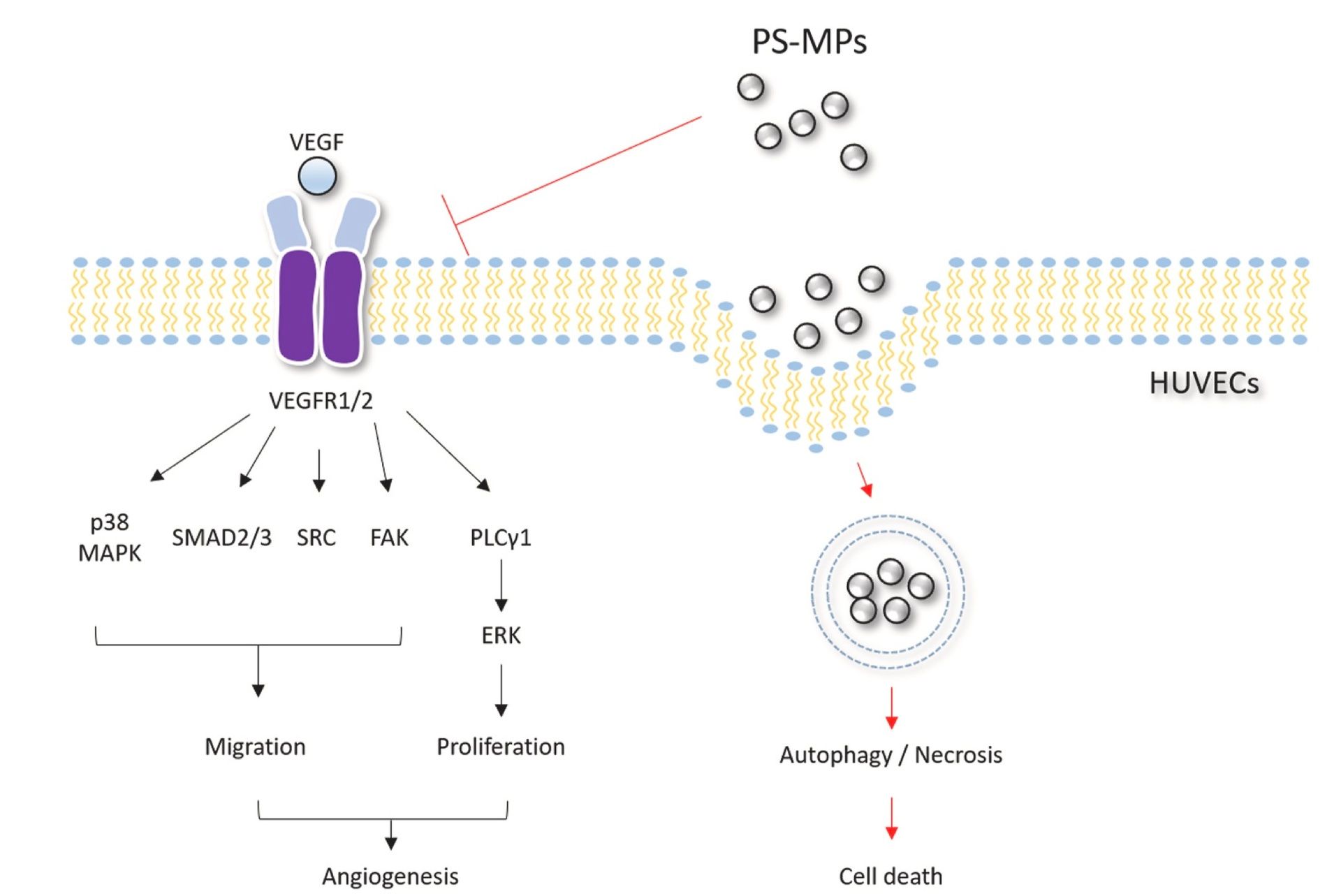

Hello {{First Name|there}},
Did you know that tiny plastic particles called microplastics are turning up in our food, water, and even the air we breathe? Scientists have long worried about what this means for ocean health, but now we are learning that microplastics may also affect our circulation system.
A study published in Food and Chemical Toxicology (2021) shows that microplastics can interfere with angiogenesis, the process our body uses to grow new blood vessels. Angiogenesis helps us heal wounds, restore blood flow after injury, and keep our tissues nourished. When this process stalls, the body’s ability to repair itself may slow down.
Using a lab test called a tube formation assay, researchers measured how well endothelial cells, the cells that line blood vessels and build new capillaries, could grow and connect. In this test, healthy endothelial cells naturally reach out to one another and form delicate, vessel-like tubes, a miniature model of angiogenesis in action. But when the cells were exposed to microplastics, those networks broke down, with higher doses showing up to a 95% reduction in new vessel growth.

This figure shows how polystyrene microplastics (PS-MPs) can be taken up by endothelial cells, the cells that line our blood vessels. Inside the cells, they block VEGF signaling needed for angiogenesis, reducing tube formation and, with longer exposure, triggering stress responses like autophagy and necrosis. Adapted from Lee et al., Food and Chemical Toxicology (2021).
What the Study Found
Here’s what the researchers found:
Disrupted new vessel growth: Endothelial cells exposed to microplastics showed up to a 95% reduction in tube formation, a clear sign of impaired angiogenesis.
Slowed healing and repair: Microplastics reduced the ability of endothelial cells to migrate, a key step in wound closure and tissue restoration.
Blocked angiogenic signals. Key pathways downstream of VEGF, including ERK, p38, SMAD2, and FAK, were suppressed, making it harder for new vessels to sprout and grow.
Triggered cell stress: Short exposures reduced vessel growth without killing the cells, but longer exposures led to autophagy and necrosis, forms of stress-related cell damage.
Size and dose mattered: Smaller microplastics (0.5–1 micrometer) had stronger negative effects than larger particles, suggesting the tiniest fragments may pose the greatest risk.
Why This Matters
Angiogenesis keeps our tissues nourished, repairs damage, and supports circulation throughout life. If microplastics can disrupt this process, the potential health impacts are significant:
Healing may slow down: Cuts, wounds, and tissue injuries rely on new blood vessels to deliver oxygen and nutrients. Disrupted angiogenesis could delay recovery.
Vascular repair may weaken: After events like injury, heart attack, or stroke, the body depends on new vessels to restore blood flow. Microplastic exposure could make this process less effective.
Chronic circulation problems may increase: Over time, impaired angiogenesis could contribute to reduced vascular resilience, especially with aging or chronic disease.
Although this study was done in lab-grown cells, the concentrations of microplastics tested were within the range humans may realistically encounter in daily life. With microplastics now widespread in food, water, and air, these findings raise important questions about how environmental exposures could silently shape our long-term vascular health.
Want a practical place to start?
Download our free guide featuring three simple, everyday ways to reduce your exposure to microplastics—small changes that may help protect your circulation and overall health.
Stay connected with us to receive the latest on evidence-based research, advancements in healthcare, and practical tips.
Best wishes,
- The Angiogenesis Foundation
P.S. Like what you’re reading? Support our mission to advance research and share science-backed health insights.
Make a donation to the Angiogenesis Foundation today.
Still up? Still scrolling? It’s time to turn off.
From the team behind AG1 and AGZ...
Tired of tossing, turning, and scrolling? Pick up the phone.
1-855-TURN-OFF is the first all-night hotline designed to turn you off.
It's simple: dial in, press a button, and hear the sweet science behind AGZ whispered directly in your ear. From magnesium for sleep support, to adaptogens for stress, to L-theanine for relaxation - every call leads to better rest.*
What are you waiting for? Click here for a toll-free and melatonin-free time.
* These statements have not been evaluated by the Food and Drug Administration.



